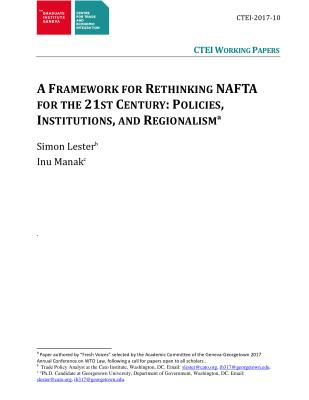The 2016 U.S. presidential campaign made the North American Free Trade Agreement (NAFTA) a prime target in a heated and divisive debate that questioned the United States' participation in the international trading system. Though campaign rhetoric typically softens as a candidate takes office, this time may be different. President Donald Trump has called NAFTA “the worst trade deal ever negotiated,” and in May 2017 indicated his administration’s intent to renegotiate NAFTA. NAFTA is certainly not perfect, as all international agreements are the product of various political compromises, but it is also not the disaster its opponents claim. NAFTA was a good deal when it was made, but it has become antiquated due to rapid changes in information technology and global supply chain integration. In addition, some of its provisions were innovative at the time, but experience has shown us where improvements are needed. As a result, a renegotiation should not be feared, but rather seen as an opportunity to reinvigorate and revitalize North American integration for a 21st century global economy. In this paper, we highlight the new policy objectives the agreement can incorporate; discuss the institutional upgrades that can improve its functioning and reduce political friction; and consider how NAFTA could serve as a framework for thinking about trade agreements that come after it, much as it did when it made its debut. We argue that while there is no need to start a revolution in trade agreements through this renegotiation process, there is a real opportunity to upgrade those aspects of NAFTA that either do not work, are out of date, or could not have been imagined at the time the deal was originally negotiated. In doing so, we draw from recent innovations found in contemporary trade agreements, such as the Trans-Pacific Partnership (TPP), and the Comprehensive Economic and Trade Agreement (CETA), where appropriate. Overall, we conclude that while the challenges may be significant, and the context of the renegotiation a bit worrying, the opportunity to upgrade the NAFTA architecture should be welcomed.



